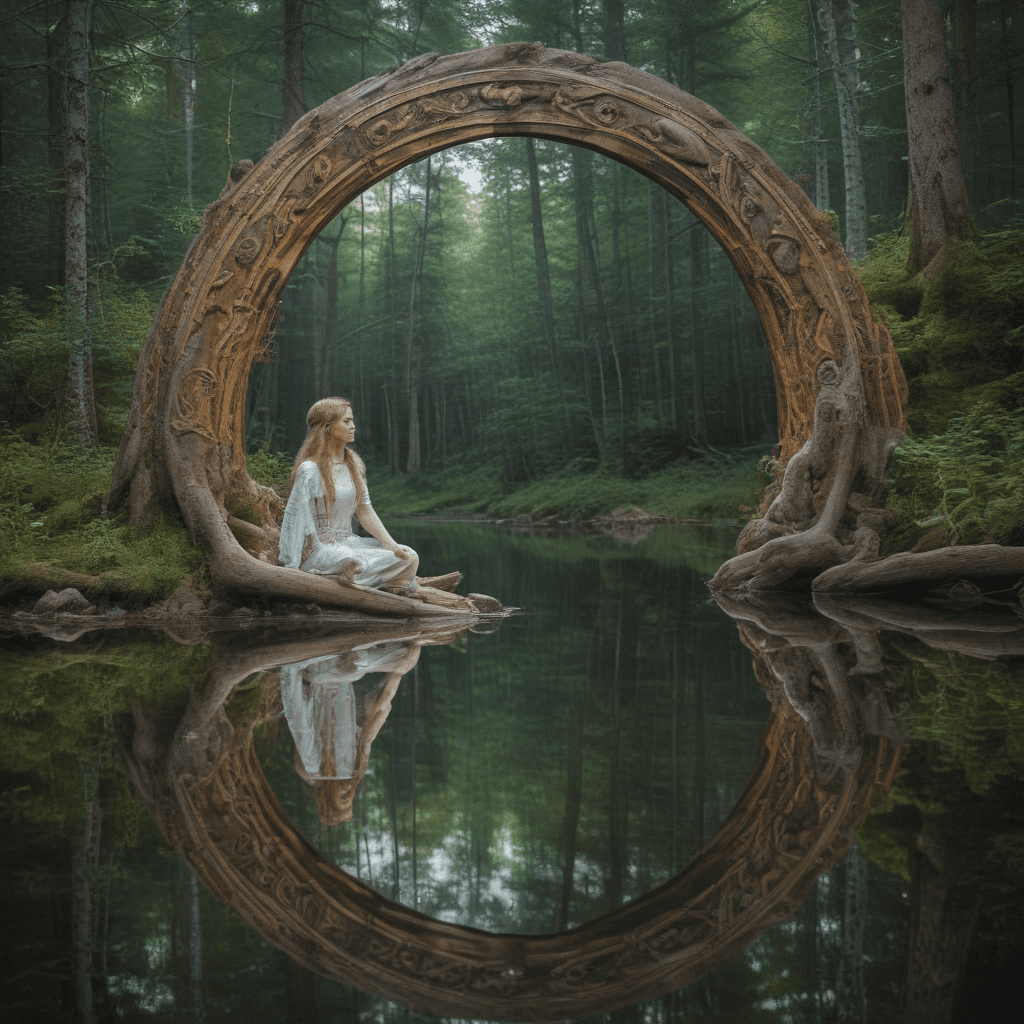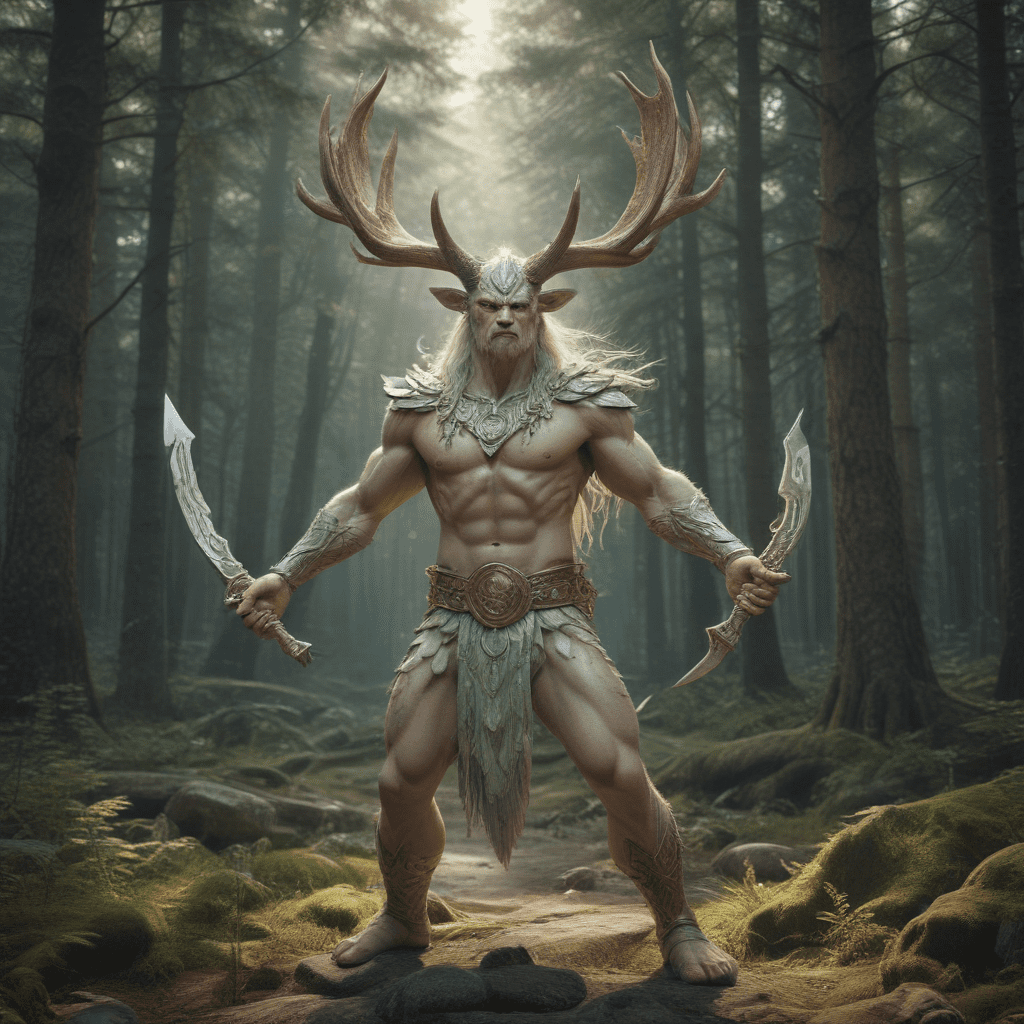1. Introduction: The Significance of Reflection in Finnish Mythology
Reflection holds deep symbolic significance in Finnish mythology, deeply ingrained in the folklore, beliefs, and worldview of the Finnish people. The mirror, lakes, and other reflective surfaces serve as potent symbols, gateways to other realms, and sources of profound transformation and knowledge. By examining the diverse roles and interpretations of reflection in Finnish mythology, we gain insights into the cultural psyche, spiritual beliefs, and the complex relationship between humans and the natural world.
2. The Mirror as a Gateway to the Otherworld
Mirrors in Finnish mythology are not mere objects of vanity but portals to the hidden realm of Tuoni, the Finnish underworld. Gazing into a mirror was believed to allow one to glimpse into this enigmatic realm, communicating with the dead and seeking guidance from ancestral spirits. Mirrors were often used in shamanic rituals and divination practices, facilitating journeys to the otherworld and enabling contact with the supernatural.
3. Lakes and Reflections as Sacred Spaces
Lakes and other bodies of water in Finnish mythology are considered sacred spaces, imbued with the power of reflection and transformation. The calm surface of a lake acts as a mirror, reflecting the heavens above and the underworld below, creating a liminal space between worlds. Waters were believed to possess magical properties, capable of cleansing and healing, and were often associated with fertility and rebirth.
4. The Symbolism of Duality and Transformation
Reflection in Finnish mythology embodies the concept of duality, representing the contrast between the visible and hidden worlds, the material and spiritual realms. By capturing both the outer appearance and the inner essence, reflections reveal the complexities of human nature, highlighting the interplay between the physical and metaphysical. Reflection also symbolizes transformation, as individuals confront their own depths and undergo profound changes through introspection and self-discovery.
5. The Reflection as a Double or Shadow
The reflection in Finnish mythology often takes the form of a double or shadow, embodying the unconscious aspects of the self. This shadow self may represent repressed desires, hidden fears, or potential unfulfilled, mirroring both the light and dark within an individual. By acknowledging and integrating this shadow self, individuals could achieve a greater sense of wholeness and balance.
6. Reflection and the Quest for Identity
In Finnish mythology, reflections play a pivotal role in the quest for identity and self-understanding. By gazing into their reflection, individuals not only see their physical likeness but also glimpse their inner depths, confronting their strengths, weaknesses, and hidden potential. The reflection acts as a mirror for self-examination, aiding in the process of introspection and the development of a strong and authentic sense of self.
7. The Role of Reflection in Ritual and Magic
Reflection holds great significance in Finnish ritual and magic practices. Shamans and other spiritual practitioners utilized mirrors and reflective surfaces as tools for divination and communication with the spirit world. By gazing into a mirror during a ritual, they believed they could access hidden realms, perceive the past and future, and receive guidance from supernatural forces. Reflections were also employed in healing rituals, as the act of mirroring was seen as a way to purify and restore balance within the individual.
8. Reflection and the Concept of Väinämöinen
Väinämöinen, the central figure in the Finnish epic poem Kalevala, is deeply associated with reflection and transformation. As a master of magic and wisdom, Väinämöinen is often depicted gazing into a reflecting pool to gain insight and knowledge. The reflection symbolizes both his connection to the otherworld and his ability to perceive the hidden aspects of reality. Through the act of reflection, Väinämöinen embodies the transformative power of self-discovery and the pursuit of enlightenment.
9. The Water Spirit and the Symbolism of Reflection
In Finnish mythology, water spirits play a significant role, embodying the duality and transformative qualities of reflection. These spirits often appear as beautiful women with long, flowing hair, their reflections shimmering on the surface of the water. Gazing upon a water spirit's reflection was believed to bring both fortune and danger, as they possessed the power to lure people into their watery realm or grant them gifts of wisdom and inspiration. The water spirit's reflection serves as a reminder of the potent and enigmatic nature of the subconscious and the potential for profound change that lies within the depths of human nature.
10. Conclusion: The Legacy and Significance of Reflection in Finnish Mythology
Reflection remains a powerful and enduring symbol in Finnish mythology, reflecting the deep connection between humans and the natural world and the belief in the duality and interconnectedness of all things. By examining the diverse roles and meanings of reflection in Finnish mythology, we gain insights into the cultural psyche, spiritual beliefs, and the complex relationship between the visible and hidden realms of existence. The legacy of reflection in Finnish mythology continues to resonate, inspiring creativity, contemplation, and a deep appreciation for the transformative power of self-discovery.
FAQs (Frequently Asked Questions)
1. What is the significance of mirrors in Finnish mythology?
Mirrors in Finnish mythology are believed to be gateways to the otherworld, allowing individuals to communicate with the dead and ancestral spirits.
2. How are lakes viewed in Finnish mythology?
Lakes in Finnish mythology are considered sacred spaces, with their reflective surfaces symbolizing a liminal space between worlds and representing transformation and healing.
3. What does reflection represent in Finnish mythology?
Reflection symbolizes duality, the contrast between the visible and hidden worlds, and acts as a mirror for self-examination and the quest for identity.
4. How do water spirits relate to reflection in Finnish mythology?
Water spirits in Finnish mythology are depicted with shimmering reflections, embodying the duality and transformative power of reflection, bringing both fortune and danger.
5. What is Väinämöinen's connection to reflection in Finnish mythology?
Väinämöinen, as a master of magic and wisdom, is deeply associated with reflection, gazing into reflecting pools to gain insight and knowledge.



